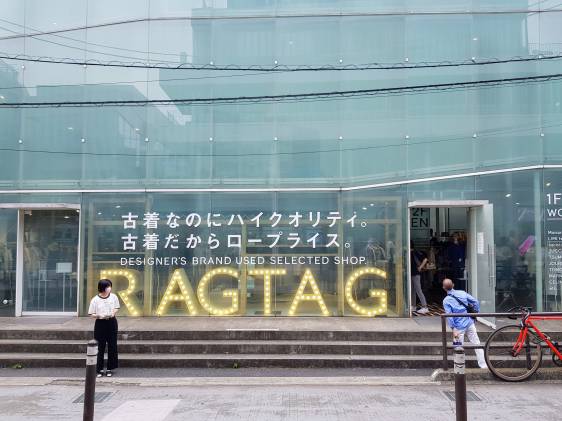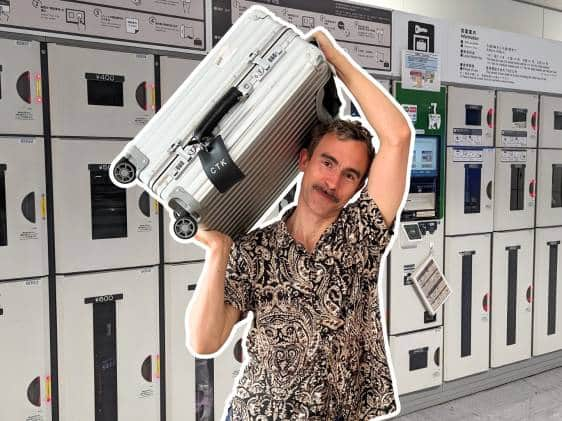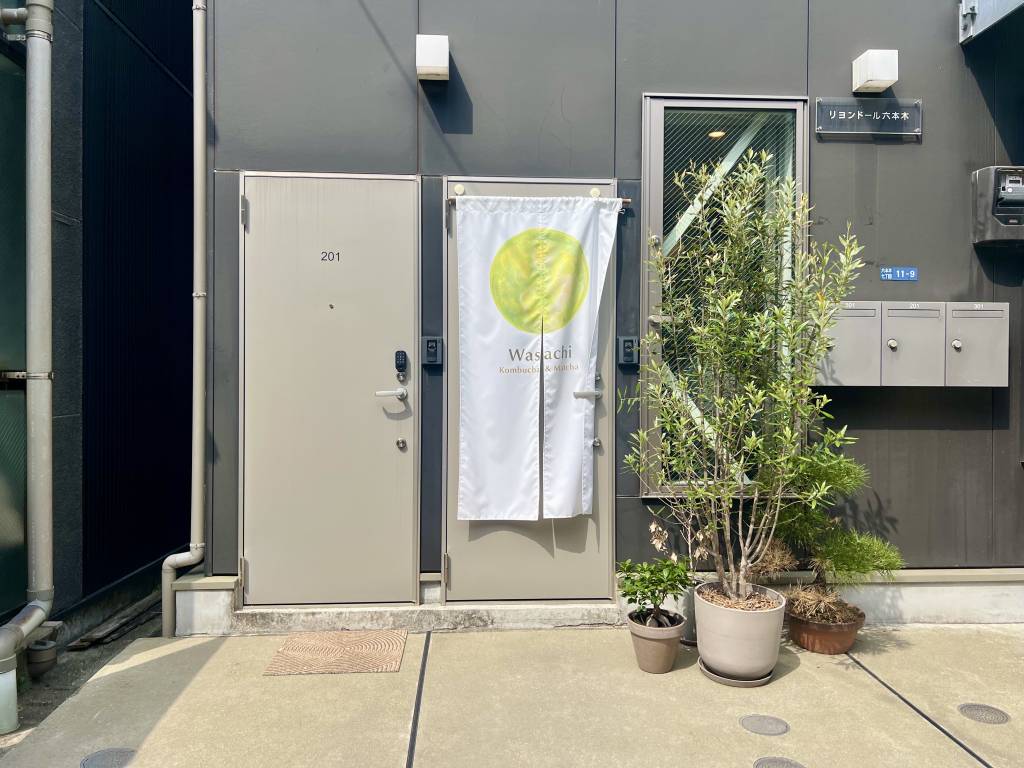Looking for an easy way to be greener and more price-conscious? Try secondhand shopping — here’s how to do it in Tokyo.
The best place to start is recycle shops — which you can find dotted all across Tokyo. Don’t be confused by the name, they’re actually secondhand shops, not recycle centres like some of us may have mistakenly assumed (*sweats*).
Basically, the Japanese word is risaikuru shoppu from the English words ‘recycle’ and ‘shop’, but they operate like secondhand or thrift shops. You can buy secondhand items like clothes, bags, shoes, electronics and other household goods, and sell (or sometimes just give away) your unwanted items.
Japanese thrift stores are heaven for the newly arrived cheapo — especially if you’ve just dropped half of your savings on renting your apartment. So let’s talk about the different recycle shops you’ll find in Tokyo.
1. Neighborhood recycle shops in Tokyo
Many residential neighborhoods in Tokyo will have at least one recycle shop. These places are usually small, cluttered, and more likely to have household goods covered in a light layer of dust than clothes. Some will do delivery/pick-up in the local area, and they are often run by surprisingly old or surprisingly young people.
Neighborhood thrift stores in Tokyo are full of bargains. We’re talking ¥50 for a brand new mug — at that price who cares if it was left over merch from a high-school sports team you’ve never heard of.
Not all of these little recycle shops will pay for your unwanted items, and in some cases they will politely refuse them if they don’t think they’ll sell. But if they do take your stuff, it will save you paying to dispose of it as sodai gomi.
Visiting your neighborhood thrift shop is a great way to support local businesses, but know that opening hours and what items are available can be unpredictable. If you’re interested in finding your local recycle shop, just look for shops with リサイクル (risaikuru, recycle) or 中古 (chūko, used/secondhand) in their name or on signs. Alternatively, search those terms on your map app (but be warned, the online listings can be very out of date).

2. The Off stores (Thrift shops across Tokyo and Japan)
The Off stores are a chain with shops all across Japan. Their stores come in a few different types, depending on what items they deal in — we’ve outlined them for you below. They range in size from single-floor shops to multistory buildings, and sometimes you’ll find a combination of the different shop types under one roof.
Mode-Off: Accessories, clothes and shoes.
Off-House: Home/kitchen appliances, baby goods, clothes, purses, shoes, fine china, yukata/kimonos and toys.
Hobby-Off: Stuffed animals, figurines, collectibles, collectible cards, anime paraphernalia and stickers.
Garage-Off: Anything that fits in a garage (large appliances, lawn appliances and some small furniture)
Book-Off: Books, manga, movies, CDs
In general, all Off stores both buy and sell. Selling prices vary depending on which type of store you’re in, but they are always quite reasonable — an English novel could cost around ¥500 at Book Off, while you could snag a thick winter jacket at Mode Off for ¥3,000. They also have online stores you can browse if there isn’t an Off store near you, but the listings are quite limited.
If selling, you do need to realize that you aren’t going to gain big bucks — it’s not unusual for them to offer less than ¥100 for a book or around ¥300 for an entire bag of clothes. Before finalizing the sale, a staff member will let you know exactly how much they’re willing to pay for each item and what items they won’t pay for but will dispose of for you. If you don’t think their offer is fair you can always decline — and lug everything back home.

3. Tanpopo House (Secondhand shops in Tokyo and Chiba)
These secondhand clothing shops are for the cheapo-est among us. They stock a range of men’s, women’s and children’s clothing, and are usually quite seasonal in their offerings — with yukata (summer kimono) and ski gear on the racks in summer and winter respectively.
We’re not going to mislead you here, the clothing at Tanpopo is cheap, with prices as low as ¥105 for a T-shirt or ¥300 for a knit jumper, but it’s a treasure-hunt kind of place. While the clothes are definitely wearable, some pieces can be a little worn-out, so be prepared to search through the racks. It’s a good place to pick up simple day-to-day items and if you’re lucky a ¥200 blouse for work.
Tanpopo House is also a good place to visit if you’re hoping to sell some clothes. They claim to purchase anything that’s in good condition — and looking at the stuff they have for sale, that’s an easy claim to believe. Store list (in Japanese).
4. Bingo (Shibuya)
Bingo is another chain thrift store with a couple of locations dotted around Tokyo. The Shibuya shop is the only one where you can buy and sell at the same time. It is a huge store too, with a massive selection of used items. You can find anything here—from books to video games and DVDs.
There is also a range of fashion items at the Shibuya store, such as watches, skirts, shoes, vests, sweater vests, parkas and long-sleeve shirts. If you’re into boy-scout and USPS shirts, and suede safari vests, you’re at a winner here!

T-shirts are a feature, too, with a T-shirt available in every color imaginable and all priced around ¥680 each. You’ll see a range of brands, including Abercrombie, Hollister, and Aeropostale, going for ¥500–¥1,990, and Brooks Brothers button-down shirts starting from ¥990 and going up to around ¥1,990.
You can find denim jackets for ¥300, with a vintage military-style jacket going for ¥2,990 — though you could find those types of jackets from ¥500 if you look hard enough. What’s cool about Bingo is that everything is in excellent condition.
5. Ragtag (Branches across Tokyo and Japan)
Ragtag is a chain of used-clothing stores, with the majority of their shops in the greater Tokyo area. Their branch in Harajuku is one of the biggest secondhand clothing shops in the area.
Ragtag has both men’s and women’s items of clothing, ranging from high-fashion brands to Japanese street brands. Because of the focus on brand-name clothing the prices are higher — think at least ¥1,000 for a T-shirt — but if you’re into that kind of thing you’ll know what kind of bargains you’re snapping up. They also have a good range of shoes, bags and other accessories for similar prices — a pair of shoes starts at ¥1,000 and goes up from there.
If you’ve got some brand-name clothes you’d like to sell, Ragtag is a good place to start. They are discerning about what they buy, but if you’ve got something they want they’re willing to pay a reasonable price for it. They also have options that allow you to post your items in for assessment, saving you the hassle of going in person (and potentially buying a bunch of stuff why you wait). Their website details the selling process and what kind of brands they accept.
5. Kinji Used Clothing (Harajuku)
Kinji Used Clothing is the place to go for secondhand Harajuku-style fashion. If you’re into that, and want it cheap, then look no further. Kinji sells clothes for all genders and boasts a really impressive selection of outfits, accessories and shoes — there are even some sports togs in the mix.
Kinji Used Clothing buys a range of goods, but if you look at the Sell Me page on their website, you’ll find out the specifics (you can machine-translate it into English if needed). You can either sell your clothing for the good-old cash option, or choose credits and use them in the store to buy other clothes there.
What’s also great abut Kinji Used Clothing is its location, only being about 50 meters form the Meiji Dori-Omotesandō intersection as you head towards Takeshita Dori. It’s also a huge store filled with all of those Harajuku guys and gals. *swoon*

Other options for secondhand shopping in Tokyo
There is an endless line-up of recycle shops offering everything you could ever need, from used bicycles to secondhand kimono. That being said, some neighborhoods, like Shimokitazawa and Koenji, are better known for their secondhand scene.
Pro tip: There are also some excellent Tokyo flea markets that you should check out.
Also read: Secondhand Tokyo: Thriftin’ Guide
While we do our best to ensure that everything is correct, information is subject to change. Originally published in January 2017. Last updated in September 2023 by Maria Danuco.




































